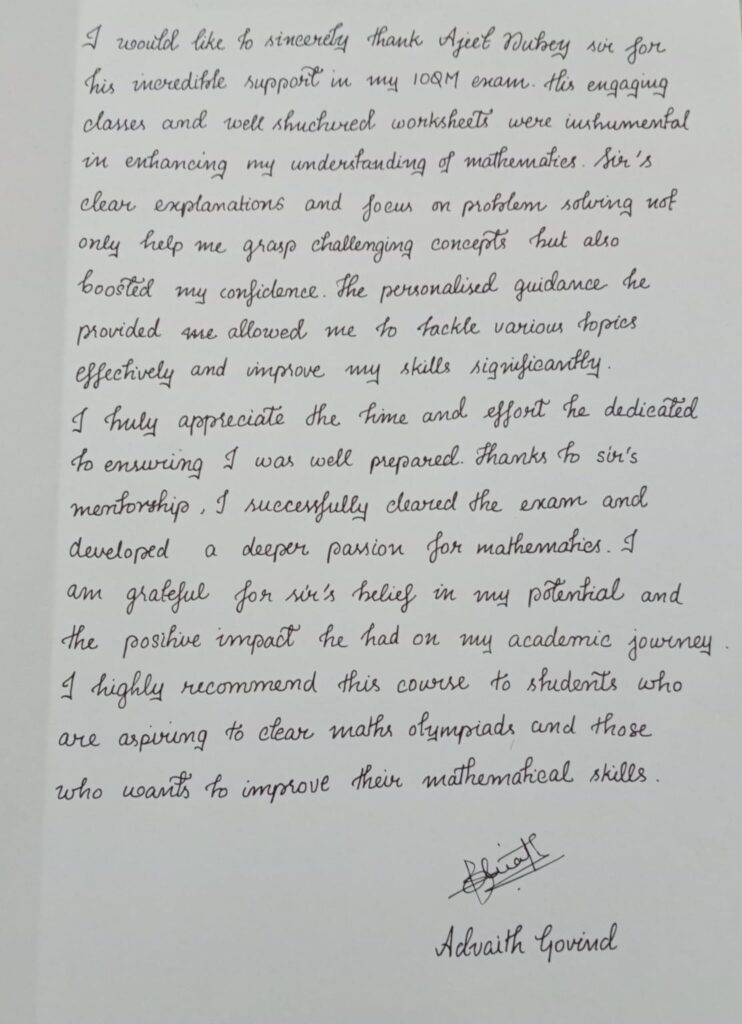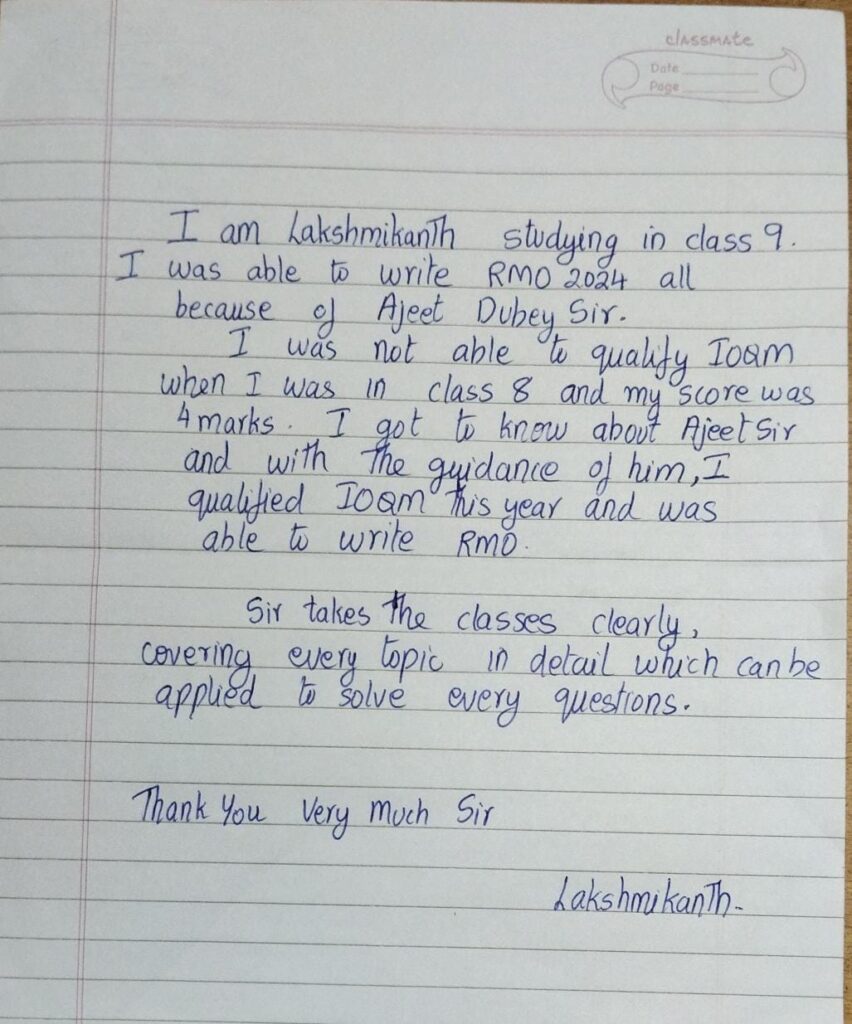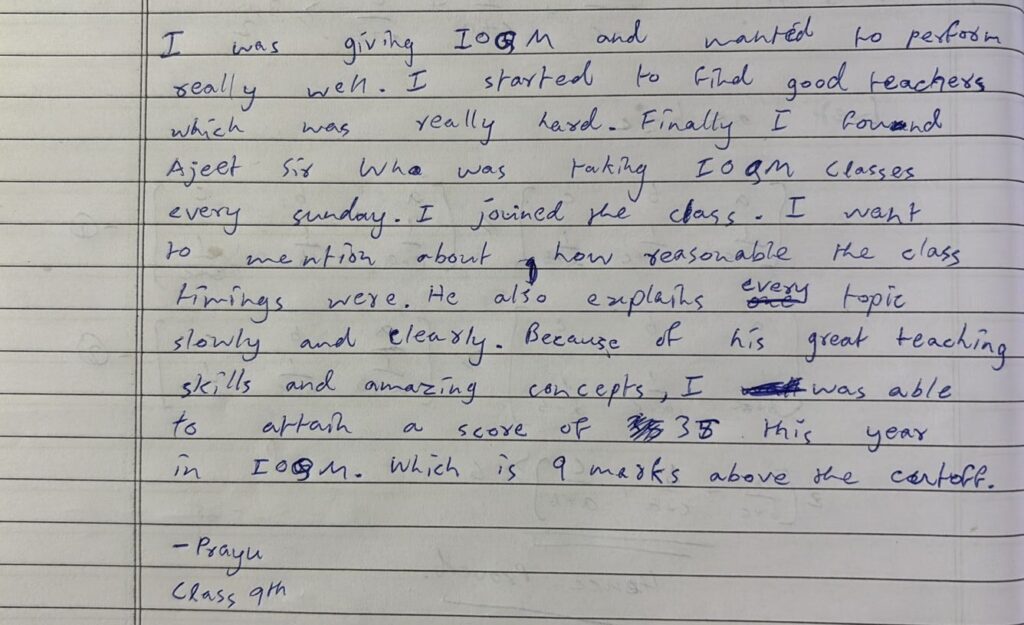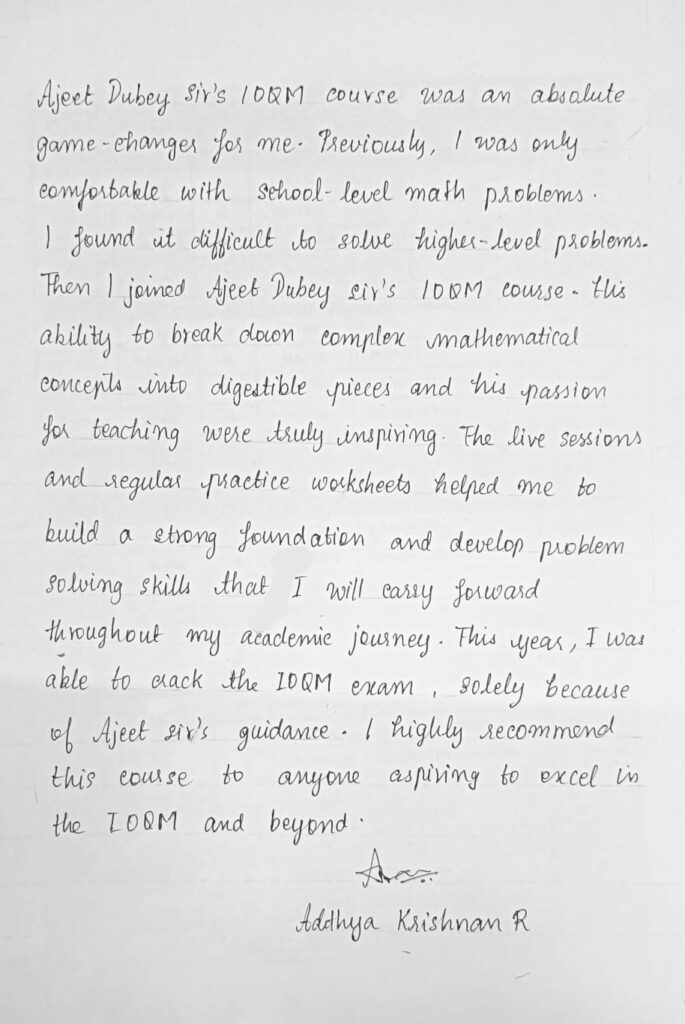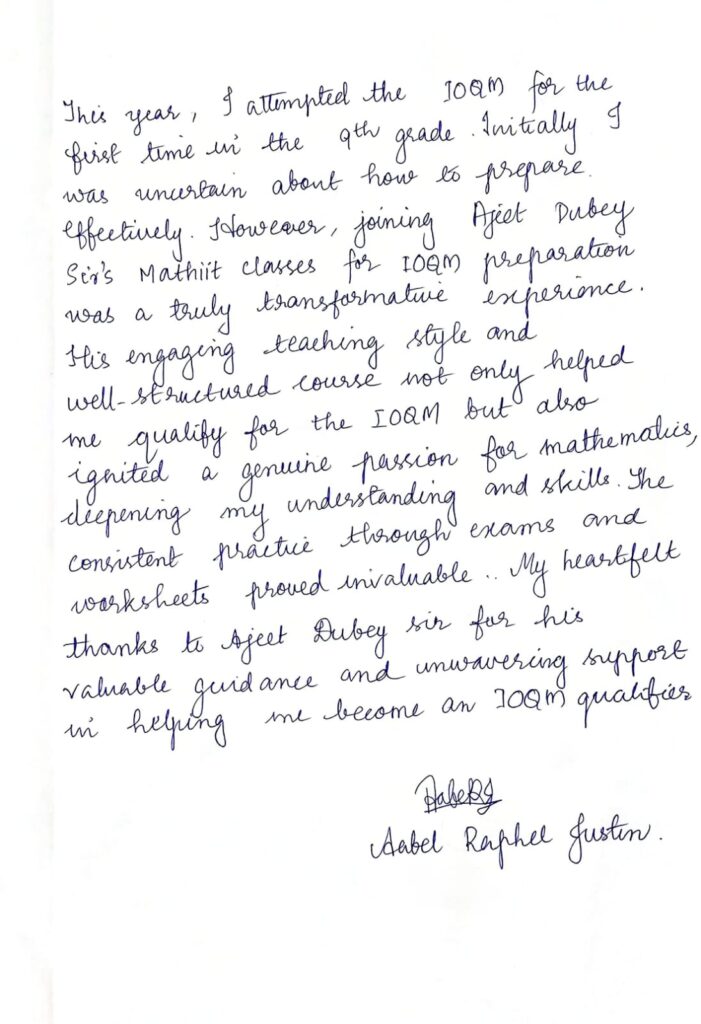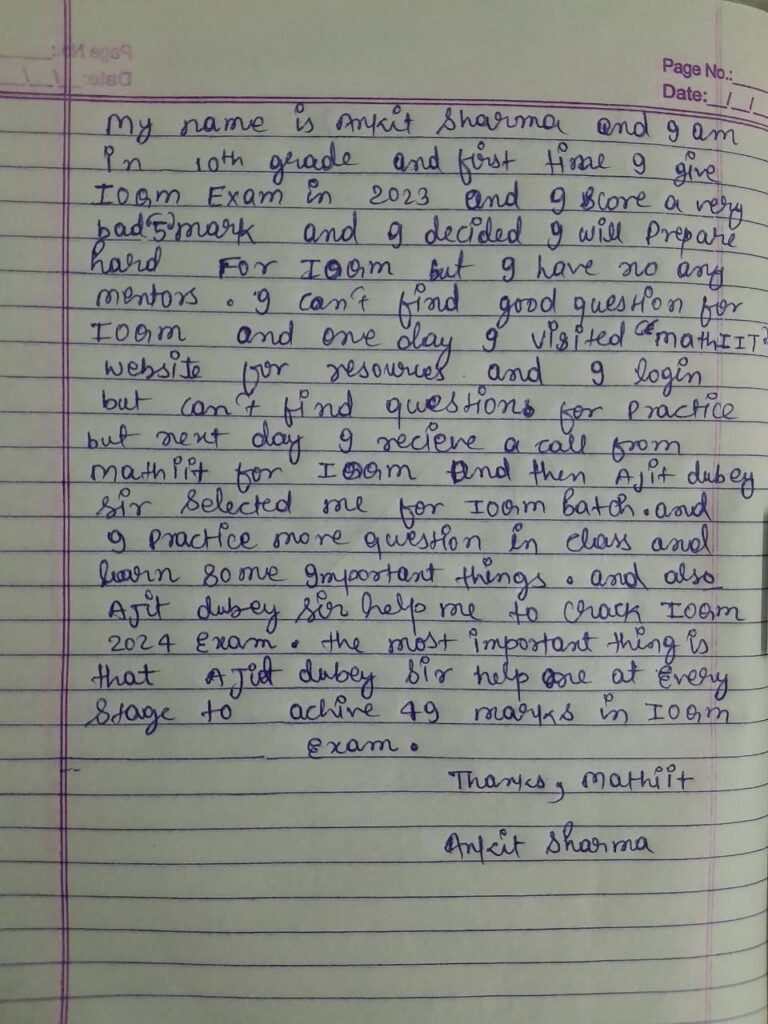MATHEMATICAL OLYMPIAD
About Mathematical Olympiad
The Mathematical Olympiad Programme in India is organized by the Homi Bhabha Centre for Science Education (HBCSE) on behalf of the National Board for Higher Mathematics (NBHM), under the Department of Atomic Energy (DAE), Government of India. This programme aims to identify and nurture mathematical talent among pre-university students across the country, leading to the participation of Indian students in the International Mathematical Olympiad (IMO).
To facilitate training and selection for this prestigious contest, the country is divided into several regions, each overseen by a Regional Coordinator. Additionally, Jawahar Navodaya Vidyalayas (JNV) and Kendriya Vidyalayas (KV) operate as separate regions with their own coordinators.
Stages of the Mathematical Olympiad
The Mathematical Olympiad Programme in India is organized by the Homi Bhabha Centre for Science Education (HBCSE) on behalf of the National Board for Higher Mathematics (NBHM), under the Department of Atomic Energy (DAE), Government of India. This programme aims to identify and nurture mathematical talent among pre-university students across the country, leading to the participation of Indian students in the International Mathematical Olympiad (IMO).
To facilitate training and selection for this prestigious contest, the country is divided into several regions, each overseen by a Regional Coordinator. Additionally, Jawahar Navodaya Vidyalayas (JNV) and Kendriya Vidyalayas (KV) operate as separate regions with their own coordinators.
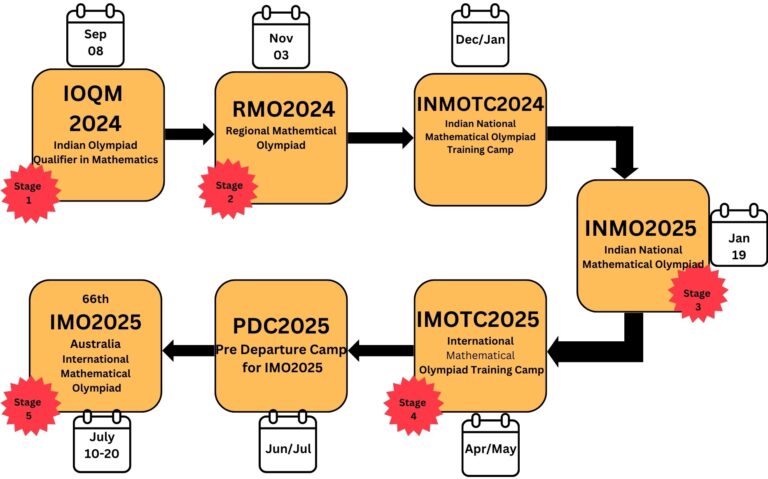
Stage 1: IOQM
The first stage is the Indian Olympiad Qualifier in Mathematics (IOQM), previously known as PRMO. It is a three-hour exam consisting of 30 questions. The answers are either single-digit or two-digit numbers, and students must mark them on an OMR response sheet. The exam is available in English and Hindi.
Stage 2: RMO
The second stage is the Regional Mathematical Olympiad (RMO), a three-hour exam featuring six problems. The RMO is conducted in English, Hindi, and other regional languages as needed by the regional coordinators. The questions are designed to challenge students with a high level of difficulty and conceptual depth.
Stage 3: INMO
Top performers in the RMO move on to the Indian National Mathematical Olympiad (INMO), held on the third Sunday of January across India. This stage selects the best students for advanced training.
Stage 4: IMOTC
Students excelling in the INMO (about 65 students) are invited to the International Mathematical Olympiad Training Camp (IMOTC), held at HBCSE or another institute in India, between April and May. This camp provides intensive training to prepare students for the IMO, focusing on building strong conceptual understanding and problem-solving abilities. Several selection tests are conducted during the camp, from which six students are chosen to represent India at the IMO.
PDC: Pre-Departure Camp for IMO
The six selected students undergo an intensive 8-10 day training at HBCSE in the Pre-Departure Camp (PDC), just before leaving for the IMO.
Stage 5: IMO
The final stage of the programme is the International Mathematical Olympiad (IMO), where the top six students represent India on the global stage. They are accompanied by a team of four mentors and teachers.
Abbreviations Used in MATH OLYMPIAD
- IOQM: Indian Olympiad Qualifier in Mathematics
Conducted by the Mathematical Teachers’ Association (India) [MTA(I)] - RMO: Regional Mathematical Olympiad
- INMO: Indian National Mathematical Olympiad
- IMOTC: International Mathematical Olympiad Training Camp
- TSTs: Team Selection Tests
- PDC: Pre-Departure Camp
- IMO: International Mathematical Olympiad
F.A.Q
Students from Class 8 to 12 are eligible to participate, provided they meet all other criteria set by the organizing body.
No, students who have passed Class 12 are not eligible, even if they have taken a break or are planning to retake Class 12 for improvement.
- Stage 1: IOQM (Indian Olympiad Qualifier in Mathematics)
- Stage 2: RMO (Regional Mathematical Olympiad)
- Stage 3: INMO (Indian National Mathematical Olympiad)
- Stage 4: IMOTC (International Mathematical Olympiad Training Camp) & TSTs (Team Selection Tests)
- Stage 5: PDC (Pre-Departure Camp) & IMO (International Mathematical Olympiad)
- Number of Questions: 30
- Total Marks: 100
- Time: 3 hours
- Nature: Offline (Pen & Paper), objective with integer answers (00-99), no negative marking.
You can register online via the official website: https://www.mtai.org.in/.
No, students residing abroad must travel to India to participate in IOQM and subsequent stages. They will be considered as enrolled from the Delhi-NCR region.
- JNV: ₹125
- KV: ₹150
- Others: ₹240
Yes, students scoring ≥10% will receive a certificate. However, this does not guarantee qualification for the RMO.
Yes, provided they meet all other eligibility criteria.
Yes, re-evaluation is allowed. The window for re-evaluation will be published on the official website: https://olympiads.hbcse.tifr.res.in.
You can access previous years’ question papers here: Past Papers.
Yes, as long as they fulfill all other eligibility criteria.
Yes, girls who qualify for INMO will receive an INMO Awardee Certificate.
No, students pursuing a 3-year diploma after Class 10 are not eligible for IOQM.
- No. Once you have selected and registered for an exam center, you cannot change it for IOQM.
You should bring a printed copy of your admit card, a valid photo ID (such as a school ID or Aadhaar), and required stationery (pencils, erasers, etc.).
Yes, students with disabilities are provided extra time or other accommodations based on official guidelines. Please check with the authorities for specific details.
The IOQM exam is conducted in English and Hindi. There is no provision for regional languages.
Yes, students must be in Classes 8 to 12. There are no additional age restrictions as long as you fulfill the class and enrollment criteria.
No. The use of calculators, mobile phones, or any other electronic devices is strictly prohibited during the IOQM exam.
You can check the status of your application by logging into your account on the official registration website (https://www.mtai.org.in/)
No, the IOQM is an offline exam conducted at designated centers. You must be physically present at the center to take the exam
The final score is based on the marks obtained in the exam. There is no negative marking, and the answer to each question is an integer between 00-99.
If you miss the IOQM exam, you will not be allowed to appear for any of the subsequent stages, as there is no provision for re-examination or makeup tests.
Yes, as long as you fulfill the eligibility criteria for both years, you can appear for IOQM in consecutive years.
There is no specific dress code for the IOQM exam, but you are advised to wear comfortable and modest clothing suitable for a school exam environment.
No, the registration fee for IOQM is non-refundable.
You can download the admit card from the official registration portal by logging into your account a few weeks before the exam.
The IOQM schedule is planned to avoid clashes with other national competitive exams. However, it is recommended to check the schedule of all exams you are appearing for.
After submitting the registration form, you may not be able to make corrections. Ensure all details are accurate before submission.
The results of IOQM will typically be declared a few weeks after the exam. You can check the results on the official MTA or HBCSE websites.
Yes, you can appear for multiple Olympiads (e.g., Physics, Chemistry, Mathematics) in the same year, but only up to the pre-final stage. However, you can represent India in only one subject at the International level.
No, there is no negative marking in IOQM. You are awarded marks based on the correct answers, and no marks are deducted for wrong answers.
Clearing IOQM allows you to qualify for the next stage, the Regional Mathematical Olympiad (RMO). It also boosts your problem-solving skills and enhances your understanding of mathematical concepts, which can be beneficial for other competitive exams.
Yes, as long as you are a student enrolled in a school in India and meet the eligibility criteria, you can appear for IOQM regardless of whether you are studying in a coaching institute.
The list of qualified candidates for RMO is published on the official MTA or HBCSE websites a few weeks after the exam. You can check the results using your roll number or registration ID.

